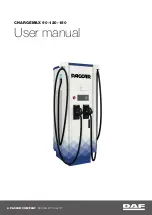
Troubleshooting Guide
Ultra-Power II, Accu-Power, and Accu-Power Onboard Battery Chargers
Page 9
∆
CAUTION
• Do not use the charger if the output is low. Batteries will not reach full charge, thereby
increasing the possibility of a harmful deep discharge during the next use.
3. THE CHARGER DOES NOT TURN OFF
New batteries or batteries charged in cold temperatures may require an extended charge time to achieve full
charge. However, if the charger runs for more than 18 hours without shutting off, the charger is malfunctioning.
4. AC LINE FUSE OR CIRCUIT BREAKER BLOWS
If this occurs, the charger may be malfunctioning or the AC line fuse/circuit breaker may be weak. Connect
another charger known to be operating properly, to the same AC outlet. If the AC fuse/circuit breaker still
blows, have a qualified electrician check for weak line fuse/circuit breaker. If the AC line fuse/circuit breaker
works properly with the second charger, the original charger is malfunctioning.
5. AMMETER NEEDLE REMAINS AT OR ABOVE 23 AMPERES FOR MORE THAN 30
MINUTES (ACCU-POWER MODEL ONLY)
This condition normally results if the charger is connected to a battery system that is less than the battery
charger rated DC output. The Accu-Power battery charger (CCI 101646401) has a rated output of 36 volts. If
a 36 volt battery charger is connected to a 12, 18, 24 or 30 volt battery system, the charge rate will not taper
below 23 amps within 30 minutes. This may also result if a 36 volt battery system is wired incorrectly or if the
battery polarity markings are reversed. Have a qualified service technician check the wiring of the batteries
and the charger receptacle.






























